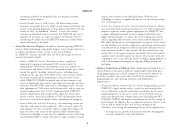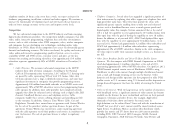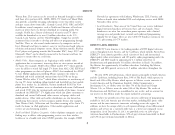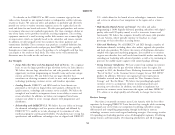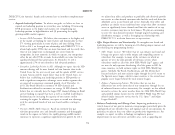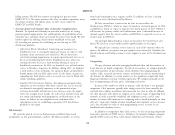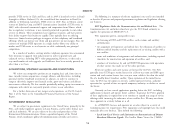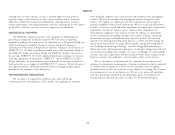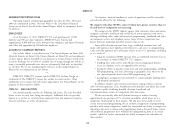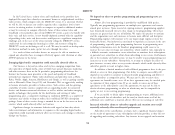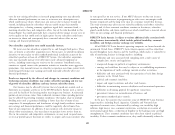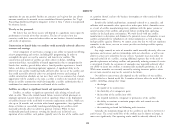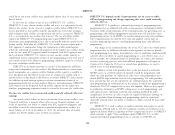DIRECTV 2011 Annual Report Download - page 37
Download and view the complete annual report
Please find page 37 of the 2011 DIRECTV annual report below. You can navigate through the pages in the report by either clicking on the pages listed below, or by using the keyword search tool below to find specific information within the annual report.DIRECTV
provides DTH service in Chile and Peru, and in 2009 it launched services in Brazil The following is a summary of relevant regulatory issues and is not intended
through its affiliate, Embratel. Oi, the second fixed line incumbent in Brazil (in to describe all present and proposed government regulation and legislation affecting
addition to Telefonica), launched a DTH service in 2009. Also, in Mexico a joint our business.
venture of EchoStar Corp. and MVS Comunicaciones launched a DTH service in FCC Regulation Under the Communications Act and Related Acts. The
2009, with substantial commercial support and cooperation from Telmex, which, Communications Act and other related acts give the FCC broad authority to
due to regulatory restrictions, is not currently permitted to provide its own video regulate the operations of DIRECTV U.S.
services in Mexico. These competitors have significant resources and have proven
their ability to grow their businesses rapidly. They typically focus on offering FCC regulations govern, among other issues:
lower-cost, limited services packages in support of their telephony and broadband • the licensing of DBS and DTH satellites, earth stations and ancillary
offerings, which can increase our churn and put pressure on our margins. Also, the authorizations;
existence of multiple DTH operators in a single market dilutes our ability to
market our DTH service as an alternative to cable, traditionally our principal • the assignment of frequencies and orbital slots, the relocation of satellites to
competition. different orbital locations and the replacement of an existing satellite with a
new satellite;
In a number of markets, existing wireline telephony operators have announced
their intention to upgrade their infrastructure in order to provide new and • terms and conditions of assignments and authorizations, including required
enhanced services, including IPTV video programming. However, to date only a timetables for construction and operation of satellites; and
very small number of such upgrades and build outs have been actively pursued on • avoidance of interference by and to DBS/DTH operations with operations
other than a test basis. of other entities that make use of the radio spectrum.
ACQUISITIONS, STRATEGIC ALLIANCES AND DIVESTITURES All of our satellites and earth stations are licensed by the FCC. The FCC
generally issues DTH space station licenses for a fifteen-year term and DBS space
We review our competitive position on an ongoing basis and, from time to station and earth station licenses for a ten-year term, which is less than the useful
time, consider various acquisitions, strategic alliances and divestitures, including life of a healthy direct broadcast satellite. Upon expiration of the initial license
potential wireless broadband investments or alliances, in order to continue to term, the FCC has the option to extend a satellite operator’s license, authorize
compete effectively, improve our financial results, grow our business and allocate operation for a period of time on special temporary authority, or decline to extend
our resources efficiently. We also consider periodically making equity investments in the license.
companies with which we can jointly provide services to our subscribers.
Currently, we have several applications pending before the FCC, including
For a further discussion of our mergers and acquisitions, see Part II, Item 8, applications to launch and operate future satellites. In general, the FCC’s approval
Note 4 of the Notes to the Consolidated Financial Statements of this Annual of these applications is required for us to continue to expand our range of service
Report. offerings while increasing the robustness of our satellite fleet. We may not obtain
these approvals in a timely fashion or at all.
GOVERNMENT REGULATION
As a DBS/DTH licensee and operator we are also subject to a variety of
We are subject to government regulation in the United States, primarily by the Communications Act requirements, FCC regulations and copyright laws that could
FCC, and similar regulatory agencies in Latin America, and by other federal, state materially affect our business. They include the following:
and local authorities. We are also subject to the rules and procedures of the
International Telecommunications Union a specialized agency of the United •Local-into-Local Service and Limitation on Retransmission of Distant
Nations, which coordinates global telecommunications networks and services. Broadcast Television Signals. The Satellite Home Viewer Act (‘‘SHVA,’’
13





